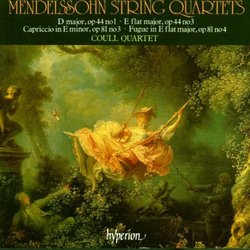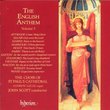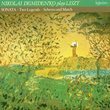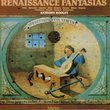| All Artists: Felix [1] Mendelssohn, Coull String Quartet Title: Mendelssohn: String Quartets Op. 44 Nos. 1 & 3; Capriccio, Op. 81/3; Fugue, Op. 81/4 Members Wishing: 1 Total Copies: 0 Label: Hyperion UK Release Date: 9/1/1993 Album Type: Import Genre: Classical Styles: Chamber Music, Historical Periods, Classical (c.1770-1830) Number of Discs: 1 SwapaCD Credits: 1 UPC: 034571166155 |
Search - Felix [1] Mendelssohn, Coull String Quartet :: Mendelssohn: String Quartets Op. 44 Nos. 1 & 3; Capriccio, Op. 81/3; Fugue, Op. 81/4
 | Felix [1] Mendelssohn, Coull String Quartet Mendelssohn: String Quartets Op. 44 Nos. 1 & 3; Capriccio, Op. 81/3; Fugue, Op. 81/4 Genre: Classical |
Larger Image |
CD DetailsSimilar CDs
|
CD ReviewsSatisfying performances, up there with the best sphaerenklang | UK | 05/20/2002 (5 out of 5 stars) "As with Schumann, Schubert and Brahms, the big question with Mendelssohn is "classical or romantic"? The music has plenty
of potential for intense emotional expression, but is written in a tightly structured way which doesn't allow for much indulgence in the usual "expressive" apparatus of rubato, wide vibrato or "big" tone. The problem for the performers is how to achieve interest and emotional involvement while respecting the details of the score - not an insoluble problem, since Mendelssohn was absolutely at home with the string quartet medium and knew exactly how to express himself in it. Still, since no score can tell you exactly how loud or fast to play, the performers' imagination and taste are crucial in realising this.Mendelssohn, in these works, is the most "classical" composer of string quartets after Haydn and Mozart: most of the tempos are moderate to brisk, there are no extreme harmonies or rhythms, and no attempt to burst the mould of the string quartet with something radically new (a la Beethoven). But these works are still minor masterpieces, on a level with Mozart's quartets - the music keeps its interest by superb craftsmanship with every few bars bringing a new detail or turn of expression. The composer shows his characteristic genius for creating moods - each movement has its own atmosphere - and also for original textures, showing that there were still new sounds to be got from the string quartet. Only very occasionally might you feel that it is "just another Mendelssohn allegro" (for example).The Coull Quartet, playing mostly with restrained vibrato and moderate accentuation, avoid the usual trap of trying to "put in" too much expression, which usually results in overheated, tiring performances. There is the occasional "portamento" (slide) - but this practice is perfectly stylish, and the music virtually requires it at some points: here, always tastefully done. The tempos are also well-judged - I didn't once think to myself "if only this were slower" (or faster!) - a pretty rare occurrence. The rhythms are near perfect, the intonation pretty good, and all players have good singing legato both in loud and soft dynamic (it's amazing how some "reputable" violinists can't play softly without desperate, and usually unsuccessful, attempts to cover up their poor tone!). This is beautifully demonstrated in the "menuetto" of the D major quartet where the first violin has a long, high line over sustained chords: the passage is extremely quiet and is performed in tempo and virtually "vibrato-free", but the effect is ethereal, almost ghostly, rather than pedantic or stiff, thanks to the superb control of tone and dynamic.The string tone is fairly light, which allows the details of the lower voices to be easily audible. However, in louder passages the music sometimes calls for a strong, dominant tone from the first violin, almost like a concerto - the leader's tone is rather thin in such passages, not quite up to the role of soloist, although at least he doesn't try to cover it up by "forcing" the tone with heavy accents or ugly vibrato. The approach of letting the music "speak for itself" works well here: it's not that there is no drama in the performance, but the score is interesting enough that just observing the markings, with an understanding of what the composer was trying to achieve, is a successful recipe. In this case, the Coulls have a persuasive grasp of Mendelssohn's intentions, and the technique to put it into practice." |





